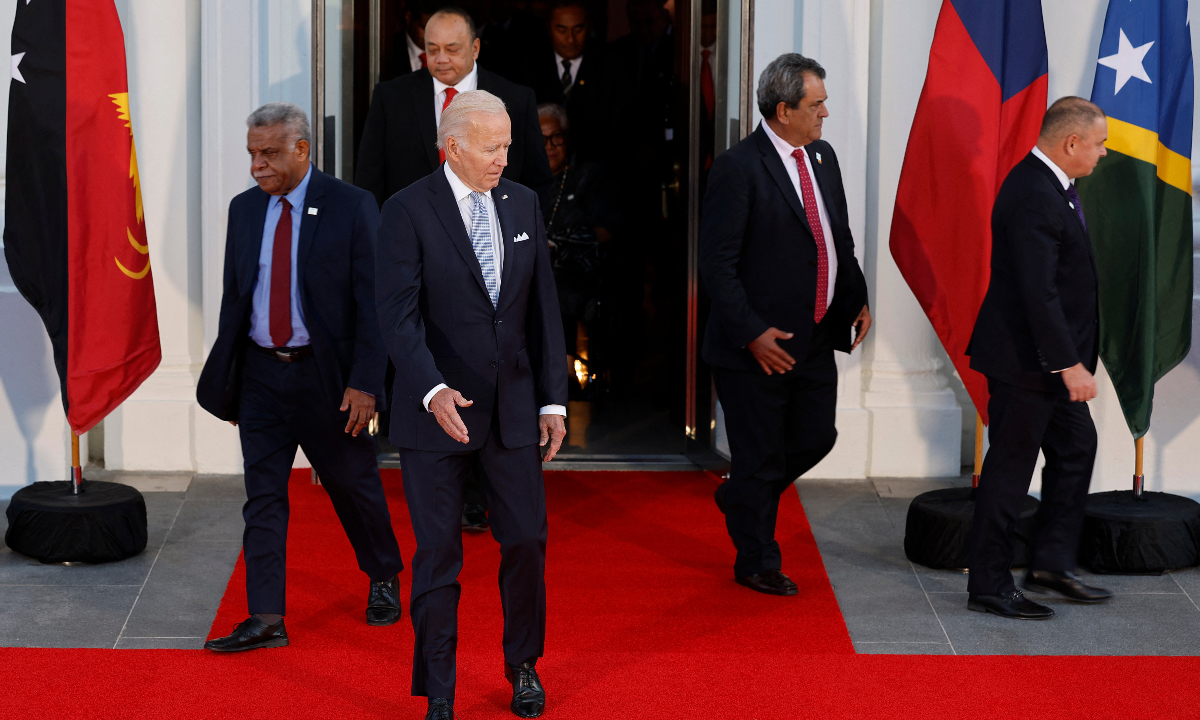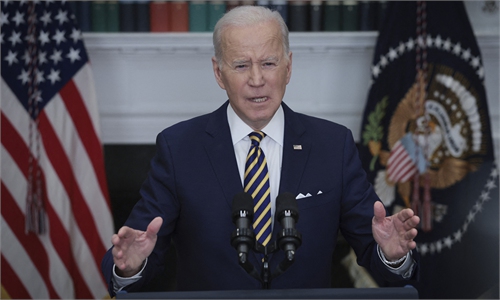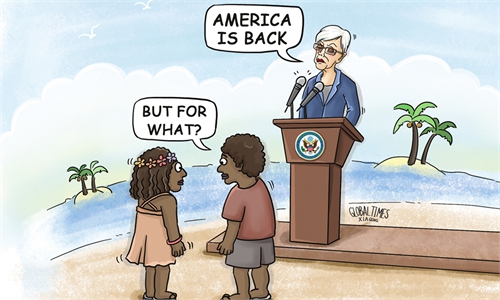US urged to sincerely support PICs in tackling climate change and achieving devt; $810 mln pledge ‘unlikely to be truly trusted’

Photo:AFP
The Chinese Foreign Ministry on Friday urged the US to sincerely support Pacific Island countries (PICs) in tackling climate change and achieving development, and refuted US' smearing of China's "economic coercion" in the region, following the first ever summit between US and PICs wrapping up on Thursday (ET) with the White House releasing the Pacific Partnership Strategy, in which Washington made a pledge of providing more than $810 million to "boost diplomatic engagement."
PICs shouldn't become "pawns" in a game between major countries. We hope the US will provide sincere support to PICs in tackling climate change and achieving development, instead of engaging in geopolitical games in the name of "cooperation," Chinese Foreign Ministry spokesperson Mao Ning said at a press briefing on Friday.
Mao said that in developing ties with PICs, China has never engaged in "economic coercion," but has always adhered to the principle of equality. "Our cooperation fully respects the sovereignty and will of the PICs… We do not impose anything on others."
The summit, which kicked off on Wednesday with a "rocky start" amid widespread skepticism from PICs, after the Solomon Islands rejected a draft US agreement and the Marshall Islands, Micronesia and Palau raised serious concerns about "insufficient" financial assistance from the US for the region.
Despite this, the White House on Thursday outlined a nine-point commitment, including boosting trade relations, maritime security, humanitarian assistance and climate change, in its US-Pacific Island strategy, US media including CNN and NBC indicated that America's true intentions are to counter China's "growing military and economic influence" in the region.
Chinese analysts stated that the summit reflects the anxiety and disarray of the American elite. And for PICs that have long been bullied and ignored by the West, it seems that it is not difficult to tell whether a new found US interest in the region is out of concern for PICs or an empty check aimed at containing China.
Chen Hong, president of the Chinese Association of Australian Studies and director of the Australian Studies Centre at East China Normal University, told the Global Times on Friday that the summit and US' subsequent commitments were mainly symbolic.
"The South Pacific Island countries were colonized and plundered by the West for a long time in history," Chen said, "And the nuclear tests and nuclear waste landfills in the region show that the US has no regard for the safety of local people and the local ecological environment."
The Marshall Islands earlier this month suspended talks to renew its security partnership with the US, regarding the longstanding impact of US nuclear testing in the nation more than 70 years ago, according to CNN. And it was only in February that the US decided to reopen its embassy in Solomon Islands after closing it in 1993.
In sharp contrast, NBC reported that it's the first time for many of the PICs leaders to visit the White House, in which high-ranking US officials like Secretary of State Antony Blinken, Commerce Secretary Gina Raimondo and climate envoy John Kerry all made appearances.
Perhaps, in Washington's eyes, the "honor" of "entering the White House for the first time", the reception of senior officials and the "huge amount of dollars" in aid are enough to make the PICs obedient, but this is the biggest disrespect to the independent sovereignty of PICs, a Beijing-based expert who requested for anonymity told the Global Times.
It's always hard to get money from the US , which is often at the cost of national dignity and even sovereignty, the expert said.
The South Pacific has long been marginalized in US' foreign policy, but with the cooperation between China and some PICs based on the principle of equality and reciprocity, the US is suddenly concerned, so it hopes to use PICs as a pawn as part of its Indo-Pacific strategy in the southern hemisphere, Chen said.
The sudden engagement from the US also reflected Washington's anxieties and tactical disarray, Chen said.
Before the summit, the US has arranged intensive visits and contacts with the island nation leaders, put together security-focused Partners in the Blue Pacific (PBP), and in this case, held a summit, all in an attempt to contain China.
The governments and people of PICs have not really felt sincere assistance from the US over past decades, and the US intention is essentially to use the PICs to prop up its dominance. Therefore, America's promises are unlikely to be truly trusted, Chen said.
It may even further arouse the Pacific Island countries' antipathy to the US' arrogant hegemonic thinking and interventionism, the expert said, "The PICs have diplomatic wisdom not to allow themselves to be used as a tool by the US to contain China."



